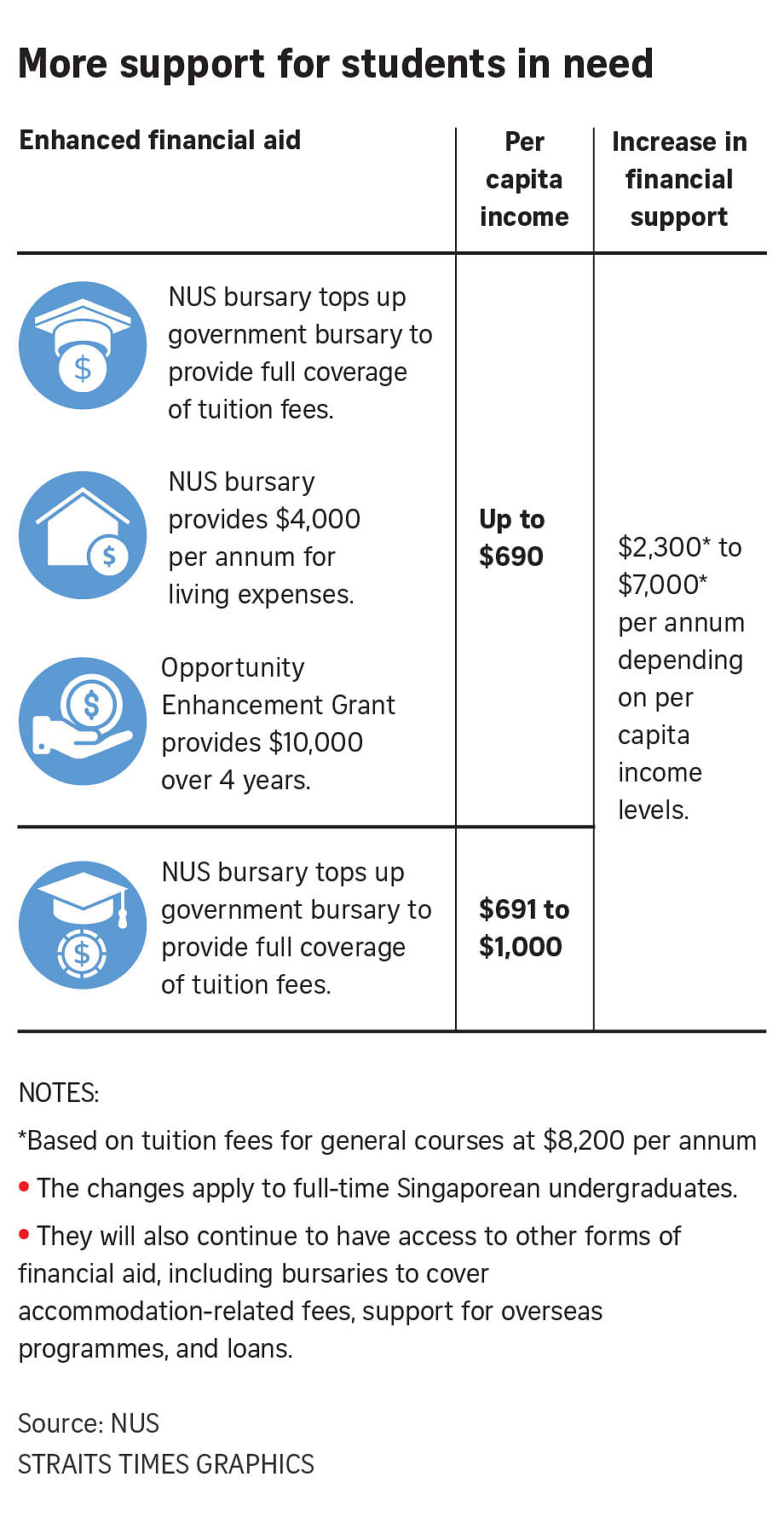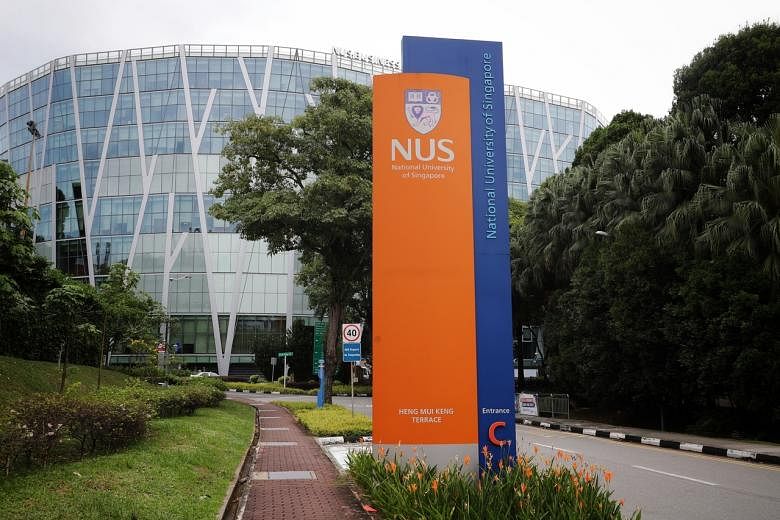SINGAPORE - All full-time Singaporean undergraduates enrolled in the National University of Singapore (NUS) will not need to pay tuition fees if they come from homes with per capita income of up to $1,000.
Starting from the new academic year in August 2022, NUS will top up existing government bursaries to fully fund tuition fees for these students, it said in a statement on Tuesday (Feb 8).
NUS is setting aside additional funding of $15 million per year for this latest enhancement in support, which is expected to benefit about 3,300 students.
Those in general courses such as in the humanities and sciences will receive an additional $2,300 to $7,000 per year in financial aid, depending on their household incomes.
NUS’ efforts to ensure students from less well-off families have access to higher education come as other organisations also beef up support due to the pandemic worsening financial difficulties for families already in need.
Self-help group Yayasan Mendaki slashed its annual registration fee for its tuition classes this year. Malay/Muslim students applying for its Mendaki Tuition Scheme only have to fork out $10 compared to $210 previously.
NUS said on Tuesday that this is part of the institution's expansion of financial support for students from less well-off families, it said in a statement on Tuesday (Feb 8).
They will receive an additional $2,300 to $7,000 per year in financial aid, depending on their household incomes.
The increased support is on top of existing financial aid, and both new and existing full-time undergraduates who meet the criteria are eligible.
Full-time Singaporean NUS undergraduates from households whose per capita income does not exceed $690 will also receive financial support in more ways.
They will each receive $4,000 yearly in bursaries to cover living expenses.
They can also each receive $10,000 over four years from a new Opportunity Enhancement Grant, if they are keen on staying on campus and going on overseas exposure programmes.
Currently, about 16,000 NUS undergraduates in need receive some form of financial assistance yearly. This is about 55 per cent of the university's undergraduate enrolment.
NUS president Tan Eng Chye said: “Low-income families in Singapore have been hard hit by this long pandemic. With more than half of our undergraduates on some form of need-based financial aid, I felt that the university needed to do more to ensure that these students will have access to the full NUS experience.
“There may also be Singaporean students from low-income households who may be hesitating to apply to university because of financial difficulties. I want to assure them that their tuition fees at NUS will be fully funded, and that more need-based financial aid will also be made available.”
He said that while students from low-income backgrounds may already receive some financial help from various sources, it may not cover all of their university costs.
“Some students may also shy away from study abroad as well as residential programmes due to financial constraints,” he added.
The latest enhancements in support will fill the financial gap for students who are most in need, said Professor Tan.
Apart from fully funding tuition fees and covering part of students' living expenses, it allows them to access a "more well-rounded and richer university experience that would include an on-campus stay and overseas exposure", he added.
NUS is in the midst of garnering philanthropic support to build an endowment that will provide sustainable funding. Several donors have pledged their support, including Quantedge Foundation, the philanthropic arm of a local fund management firm Quantedge Capital, as an anchor donor.
In the statement, Quantedge Foundation board member Suhaimi Zainul-Abidin said it shares NUS' belief that education is a powerful social leveller.
"Every student who qualifies, by merit, to attend university should not pass up on the opportunity to do so due to their financial situation," he said.
"We are excited to seed-fund NUS' game-changing initiative to guarantee full funding of tuition fees and defray the costs of living expenses and overseas programmes for all Singaporean students with demonstrated financial need," he added.
"This is a major step forward in our continuing push for all deserving Singaporeans to have access to a truly need-blind university education across all autonomous universities in Singapore," said Mr Suhaimi.
Ms Melanis Tai said having financial support lightened the load of her tuition fee loan and living expenses. During her time in NUS, the 25-year-old, who graduated from the Faculty of Arts and Social Sciences last December, received the Chia Siew Wong Bursary, on top of a government bursary.
"It really helped a lot. If not, I would have to work a lot more," said Ms Tai, who has taken up part-time jobs as a front-desk staff member at a yoga studio and a fitness studio since her polytechnic days.
She is the oldest of three children, whose single mother works as a service staff member at a food and beverage kiosk.
The bursaries also gave her peace of mind to focus on her studies and explore other activities such as going on exchange to Sydney, Australia. She also took on an internship and represented Singapore in an international beauty pageant in South Korea.
"I felt like exchange was a very integral part of my NUS journey and I feel like everybody should have the experience at least once in their life," said Ms Tai, who is now working in the public service.
Support for needy students
Universities
- Students whose families were hit hard by job losses and health challenges amid Covid-19 were given financial relief, through grants and funds by institutions such as Nanyang Technological University and Singapore Management University.
Chinese Development Assistance Council (CDAC)
- CDAC spent about $33.6 million last year helping families. It has budgeted $36.4 million this year.
- It is raising the quantum for its CDAC-Singapore Federation of Chinese Clan Associations Bursary by 7 per cent from this year. Primary school pupils will receive $300 a year, up from $280, while secondary school students will get $480, up from $450.
Yayasan Mendaki
- The group handed out more than $45 million in tertiary tuition fee subsidies and study loans last year to nearly 12,000 students.
- It also gave out over $1.9 million in bursaries, scholarships and awards to more than 7,000 students last year.
NTUC First Campus
- The pre-school operator’s Bright Horizons Fund channelled about $2.4 million last year to bridge income and learning gaps.
- More than 4,200 children in NTUC pre-schools received a one-time top-up of $400 to their Child Development Account (CDA) last year.
PAP Community Foundation (PCF) and Temasek Foundation
- From June 2021, about 8,500 PCF Sparkletots children from low-income homes get a top-up in their CDA of $200 per year for two years, thanks to the Temasek Foundation First Step Programme. The foundation is providing $3.38 million funding to support the scheme. With the Government’s dollar-for-dollar matching contributions, each child’s CDA will receive a total of up to $800 over two years.



